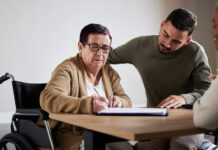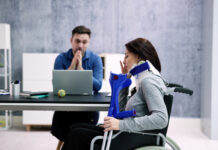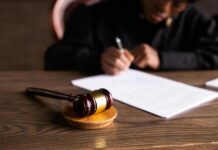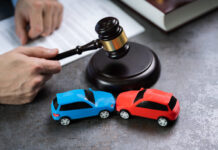By Carla Joseph
In the blink of an eye, you find yourself in a situation that no one ever wants to be in – a car accident. It’s jarring, it’s unexpected, and it can be incredibly confusing. This guide provides a detailed roadmap on what to do when you hit a car in Bloomington. Follow these steps, stay calm, and let’s navigate this together.
What to Do When You Hit a Car in Bloomington: Immediate Steps
Check on Everyone Involved
The first and most important step when you hit a car is to check on everyone involved. Are you hurt? Are your passengers? What about the other driver? If anyone needs medical attention, call 911 immediately.
Move to a Safe Location
If it’s possible and safe to do so, move your car out of the way of traffic. If not, turn on your hazard lights to signal to other drivers.
Call the Police
Even in minor accidents, it’s always a good idea to call the police. They can help manage the situation and create an official accident report, which can be crucial in dealing with insurance companies and any potential legal issues.
Documenting the Accident Scene
Gather Information
Now, you must collect as much information as possible about the accident. This includes the other driver’s contact and insurance information, pictures of the accident scene, and witness testimonies if available.
Notify Your Insurance Company
Immediately after the accident, notify your insurance company. Provide them with all the details and cooperate fully. This step is crucial, especially if you want to claim damages later on.
Legal Ramifications
Understand Your Legal Responsibilities
In Indiana, like most states, drivers are required by law to stop their vehicles and remain at the scene if they’re involved in an accident. What happens if you don’t? You could potentially face hit-and-run charges, which carry severe penalties.
Consult a Lawyer for a Car Accident
When you’re involved in an accident, consulting with a lawyer for car accident can help navigate the complex world of insurance claims and legal proceedings.
Dealing with the Aftermath
Repairing Your Vehicle
After an accident, getting your vehicle back on the road is a top priority. But it’s crucial to ensure repairs are done properly and safely. Start by contacting your insurance company to understand your coverage limits and the process. You might need to get estimates from several repair shops, so choose reputable ones to ensure quality work. Check reviews, ask for recommendations, and don’t rush the decision. Once the repairs begin, stay in touch with the shop to ensure the work is going as planned. Ultimately, your goal is to restore your vehicle to its pre-accident condition for safe driving.
Dealing with Insurance Claims
Navigating through the process of insurance claims can be a daunting task. Once you’ve reported the accident to your insurance company, you’ll likely need to fill out an accident report form and provide any evidence you’ve gathered at the scene. The insurance company will then send an adjuster to assess the damage. It’s important to cooperate, but also know your policy well to ensure you get a fair claim. Remember, if you feel overwhelmed or the claim becomes complex, consider hiring a lawyer for a car accident to guide you and ensure your rights are protected.
Prevention and Safety Measures
How to Avoid Accidents
While some accidents are unavoidable, understanding the common causes of accidents can help you minimize the risks.
Importance of Safe Driving
Safe driving is more than just a legal obligation; it’s a civic duty. Every time we get behind the wheel, we hold lives in our hands, both our own and others. Careful, attentive driving reduces the risk of accidents, protecting not only ourselves but also our fellow drivers, pedestrians, and the community at large. By following traffic laws, staying alert, and driving defensively, we contribute to a safer, smoother-flowing traffic environment.
FAQs
Here are some of the most commonly asked questions about what to do when you hit a car in Bloomington:
1. Do I need to call the police after a minor accident?
Yes, it’s always a good idea to call the police after an accident, no matter how minor.
2. What if the other driver doesn’t have insurance?
If the other driver doesn’t have insurance, you should still report the accident to your insurance company. They can guide you on the next steps.
3. How do I deal with the other driver’s insurance company?
Always consult your insurance company or a lawyer for a car accident before dealing with the other driver’s insurance company.
4. Do I need a lawyer after a car accident?
While it’s not mandatory, having a lawyer can help you navigate the complexities of insurance claims and legal proceedings.
5. What information should I collect at the accident scene?
If available, you should collect the other driver’s contact and insurance information, photos of the accident scene, and witness testimonies.
6. What if I’m at fault in the accident?
Even if you’re at fault, it’s essential to follow all the steps outlined in this guide. Consult with a lawyer for a car accident to understand your legal responsibilities.
In conclusion, knowing what to do when you hit a car in Bloomington is crucial to ensure everyone’s safety, fulfill legal requirements, and handle insurance matters. Keep calm, follow these steps, and remember – it’s always okay to seek help when you need it.
About the Author
 Carla Joseph is a renowned law writer who seamlessly blends her expertise in the legal field with her exceptional writing skills. With a legal degree and years of practice as a legal professional, Carla has dedicated herself to making the law accessible to a wider audience. Through her captivating articles and blog posts, she demystifies complex legal concepts and presents them in an engaging and relatable manner. Carla’s unique ability to combine her legal knowledge with a compelling writing style has earned her widespread recognition and respect. Her work not only educates readers but also inspires them to engage with the law, empowering individuals with a deeper understanding of their rights and obligations.
Carla Joseph is a renowned law writer who seamlessly blends her expertise in the legal field with her exceptional writing skills. With a legal degree and years of practice as a legal professional, Carla has dedicated herself to making the law accessible to a wider audience. Through her captivating articles and blog posts, she demystifies complex legal concepts and presents them in an engaging and relatable manner. Carla’s unique ability to combine her legal knowledge with a compelling writing style has earned her widespread recognition and respect. Her work not only educates readers but also inspires them to engage with the law, empowering individuals with a deeper understanding of their rights and obligations.




































































